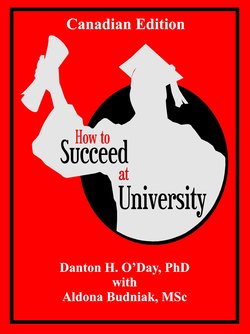Читать книгу How to Succeed At University--Canadian Edition - Danton O'Day - Страница 7
На сайте Литреса книга снята с продажи.
It’s Your Future
ОглавлениеMost students attend university to obtain a degree. That’s a simple fact. It wasn’t always this way. Years ago students attended university to learn for the sake of learning, but that’s not the way it is today. You will probably attend university for the purpose of making it through three or four years to emerge with a Bachelor’s degree in some area of specialization. If you are like many students you will start out with the intention of entering some professional school. Perhaps you intend to be a doctor or a dentist or to enter some other equally remunerative occupation.
Most universities have many professional faculties. Here is a partial list: architecture, dentistry, forestry, law, medicine, rehabilitation medicine, nursing, pharmacy, veterinary medicine, graduate studies, management studies, criminology. You should contact the ones you are interested in for details.
I teach cell biology and a course in human development so it’s not surprising that many of my students are motivated to become medical professionals. If I had a dollar for every student who told me he or she was going to be a doctor, I would be rich. The sad part is few students have the grades to enter medical school, let alone any other professional school.
One of my big concerns as a teacher has to deal with students who have unrealistic goals. It is not easy trying to gently explain to a student with a 75% average or less that he or she has no chance of even being considered by a reputable medical school as a potential student. If a student has such unrealistic expectations, I often try to guide that student along by asking if he or she has ever thought of alternative occupations which are more in keeping with his or her marks (GPA or grade point average).
While I am not a counsellor, I give students some suggestions about potential alternative life choices hoping that in time, they will move these secondary choices to the front line when they realize their marks won’t be enough to allow them to apply let alone get accepted to medicine. If the students persist in their single-mindedness, I don’t try to dash their dreams but suggest that they then need to focus entirely on their studies if they hope to meet their goal. You also need to determine if your current goals are realistic. Ask yourself some questions:
•Why are you taking the courses you are taking?
•Are your grades good enough to get accepted to any postgraduate program?
•Do you like the courses and program you are taking?
•Do you find that you often question what you are doing?
•Are there some other areas that seem more interesting?
Unfortunately, the reality is that there is very little chance of you being accepted by a professional school. Just look around you and assess how many doctors there are per capita and you will realize that not everyone gets to be one. I have no intention of bursting bubbles or telling you that your dreams are not possible. You are reading this book, but I don’t know who you are or whether you have the potential to be admitted to a professional school. If you do have the potential, then I sincerely hope that you can reach your goal. I also hope that this book will help you in your quest. This book can help you generate the high grades needed for admission to professional schools, but it cannot work the miracle of increasing the number of places in these schools. This is where I would like to offer you some other aspects of succeeding at university.
Look at your transcripts. Often your marks reflect your true interests. If you are getting great marks in specific courses, that could indicate your special interests or abilities in that subject area. Look at what options and opportunities exist in that area and try to determine if that’s a route to follow. I’d also advise you not to panic. Sometimes students don’t really figure out what they want in life until it’s almost time to graduate. Remember, a good education will serve you in a diversity of ways that may have nothing at all to do with the specific subjects that you studied.
Did You Know?
According to 2006 data, only 60% of those with a Bachelor’s degree or university certificate held a job “closely related” to their field of study. This percentage varied by subject area; those that graduated from education and health programs were the most likely to have a job closely related to their studies, while arts and humanities graduates were least likely to hold a job closely related to their education.3
